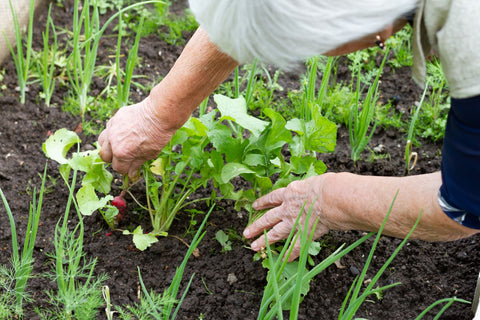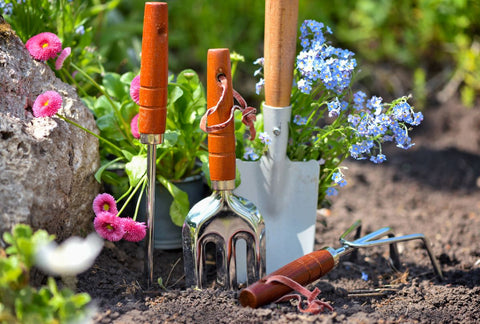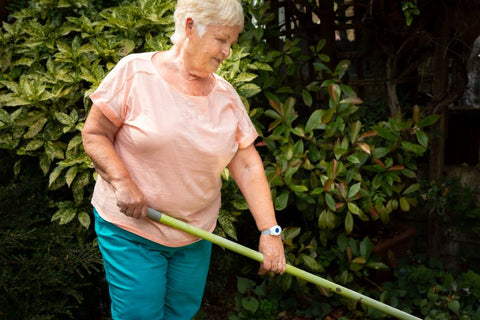After a freezing winter, Spring brings a lovely feeling of warmth and renewal. As the earth warms up, new flowers begin to bloom. However, the beginning of the year might still feel a bit too cold to start gardening.
Gardening is a relaxing activity for people of all ages, but in the later years, it can feel overwhelming for some older adults with limited mobility if there is a lot that needs to be done. As we age, our joints become stiffer, making bending down and performing tasks such as pulling weeds or planting seeds more challenging. Arthritis can also cause difficulties in holding a trowel and digging in the soil. Apart from this, there may be other medical health conditions that can affect a person's enjoyment of gardening.
We take a look at challenges that older adults might face while gardening and tips that can make gardening a little easier and safer for them, so they can continue to enjoy their hobby and benefit from gentle activity and being outdoors.
Challenges faced by the elderly while gardening

Gardening can be a great hobby to keep older adults healthy as it's a low-impact exercise that allows them to stretch and stay flexible. Due to age, gardening becomes more challenging, especially in the cold early months of the year. Also, there are increased risks associated with being outdoors during this time.
Decrease in mobility
Older adults who experience mobility limitations may find it challenging to perform gardening tasks that require extended bending, kneeling, or standing periods.
Decrease in strength and stamina
Ageing can make physically demanding gardening activities like digging, lifting heavy objects, or pushing wheelbarrows difficult due to decreased strength and stamina.
Stiffness in joints and Arthritis
Arthritis can cause joint stiffness and pain in older adults, making it uncomfortable to perform tasks such as pruning or weeding that require repetitive movements.
Problems with balance
Due to balance issues, the elderly are at a higher risk of falls when walking on uneven garden landscapes or stepping over debris in the garden.
Changes in senses
Age-related vision issues and hearing loss are common in the later years. Due to these changes, older adults sometimes find it harder to risks and potential causes of accident.
Increased sensitivity to temperature
Older adults may have a declined ability to control body temperature, making them more sensitive to the cold during winter gardening sessions. Their immune systems also become weak, making them susceptible to cold, flu, and other respiratory issues.
Slippery Surfaces
Wet or icy surfaces in the garden during the winter months can increase the risk of slips and falls, particularly for older people with mobility or balance issues.
Tips for getting garden ready for Spring
Cleaning the garden
Tidying the garden after a long time can seem like a never-ending chore, but regularly tidying it up might make it more manageable. When preparing your garden for Spring, it's important to collect any dead leaves and stalks lying on the ground as they can harbour diseases and allow bacteria to grow, infecting your plants and harming their growth.
A little cleaning up at the start can go a long way in ensuring a healthy growing season for your garden. In addition to the plants, you may also want to scrub up your patio. A good sweep with plenty of water should make it easier, but if you're using any cleaning products, make sure you don't spray them on your plants.
Put plant waste into compost
After collecting all the dead leaves and organic matter from your garden, it's important to dispose of them properly. Some councils offer a garden waste home collection service, while others provide a particular bin and collect it as part of the regular bin collection scheme. Local household waste recycling centres also collect garden waste, so you can dispose of it there if possible. However, collecting and putting all the organic matter in a compost bin or compost pile is recommended, as it can be a nutrient-rich mulch for your garden.
Checking your garden tools

Spring is the time to check the pots and containers for your new plants and keep your gardening tools clean and free from germs. Inspecting all the tools and equipment before the gardening season fully begins is a good idea. Sharpen and oil any pruning knives to make sure you get a clean cut when using them on your plants.
Wash your small tools in mild soap and warm water; for larger equipment like shovels, you can use a hose to spray water on them. A wire brush or damp cloth can be used to clean any wooden handles, and mineral oil can be applied to keep them usable. Make sure to replace or repair any tools or equipment that are old or rusty.
Gardening can be physically demanding, so it's important to select ideal gardening tools that can make the task easier, especially if you experience difficulty with bending, lifting, or extending as much as you used to.
Get rid of weeds
While you take a break from gardening during the cold weather, weeds can thrive in your garden. You should remove as many weeds as possible as you get your garden ready. Gardeners all around the world struggle with weeds as they compete with plants for natural resources such as water, sun and space and are also known to attract pests.
If you are an experienced gardener, you might be aware that getting rid of weeds is a year-round job. So, making sure to remove any weeds while you are prepping your garden for Spring is a good idea. Weeds can be either removed by hand or by using a weedkiller.
Choose low-maintenance plants
If you are finding gardening challenging, you can swap some high-maintenance plants for low-maintenance crops like carrots, onions, spinach, shallots, and broad beans. You can also consider growing some useful plants and herbs like basil, rosemary, chives, ginseng, and thyme; these require little maintenance and can be grown year-round. Buying plug plants can help with skipping the seed-sowing stage.
Make adjustments to your garden space
If you find it challenging to get up and down from the ground, you can consider installing raised flower beds, pots and containers, and window boxes. These can be set up at the waist or hip level to allow you to grow flowers and plants comfortably. You can also put benches or chairs in the garden so that you can take regular breaks while preparing your garden for Spring.
Consider a personal alarm for when gardening alone

For many older adults and their loved ones, there is always a constant worry about having a fall or another emergency, especially when there is no one around to help them. As we discussed, challenges due to physical or medical health concerns in winter might cause more trouble.
A personal alarm that works in the home, garden or elsewhere might be a great solution that gives them, and their family peace of mind that help is at hand if needed.
The gardener can wear the alarm, and the button can be pressed if required, which alerts the 24-hour monitoring Emergency Resolution Centre, who then calls the older adult to check whether everything is okay.
For example, Taking Care Anywhere is an elderly GPS tracker alarm that works in the home, garden, or anywhere else in the UK, so it is ideal for older people who want to start preparing their garden for Spring. We have a range of fall alarms and care alarms that work in the home and garden.
With these tips for how to get your garden Spring-ready more efficiently and safely, we hope that many senior gardeners can enjoy lots more happy times outside in their gardens and outdoor spaces.




